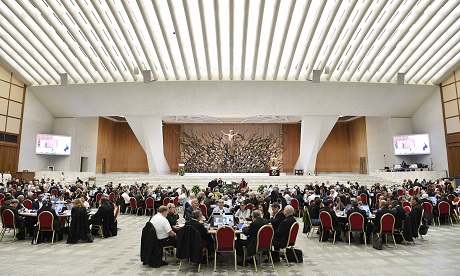The much anticipated “synthesis report” from October’s synod on synodality was released after the confidential Vatican-based meetings concluded on Sunday.
The synthesis report summarises synodal discussions about how a synodal Church’s ministries and structures can give a wider role for laity which is more in line with the vision of Vatican II.
Big issues discussed at the synod were identified in its two-year lead-up, and besides reporting on the past month, the report also lays the foundation for the second part of the Synod scheduled for October 2024.
At the time of CathNews publication, the report was only available in Italian!
- Note: The report is now available in English as a PDF document.
The synthesis report
The synthesis report outlines key proposals discussed between some 450 participants from around the world.
It covers off areas of convergence, matters for consideration and proposals that are expected to set the stage for further debate throughout the year ahead of next year’s assembly.
For the first time ever at a Synod of Bishops, voting members included lay women, laymen and other non-bishops.
Voting on the document was taken paragraph by paragraph on Saturday.
A two-thirds majority vote threshold was set for passing each paragraph.
Although the report makes 81 proposals, many are open-ended or general.
Further theological or canonical study, evaluation or consideration is called for at least 20 times.
Yes and No votes
More than 80 proposals were approved in the synod vote.
These include establishing a new “baptismal ministry of listening and accompaniment,” initiating discernment processes for decentralising the Church and giving lectors a preaching ministry.
The most ‘no’ votes – accounting for about a fifth of the delegates – were given to two primary paragraphs addressing the possibility of women deacons.
One passed by a vote of 277-69; the other by 279-67.
“That means that the resistance [to women’s leadership] is not so great as people have thought” the Vatican’s Cardinal Jean-Claude Hollerich said.
A paragraph addressing the question of clerical celibacy also received substantial No votes, but passed at 291-55.
Women
The synthesis report does not call immediately for the ordination of women as deacons. Nor does it mention calls for priestly ordination for women.
It does include however, a “clear request” from the assembly that women’s contributions “would be recognised and valued, and that their pastoral leadership increased in all areas.”
The synthesis report also questions how the Church can include more women in existing ministries.
“If new ministries are required, who should discern these, at what levels and in what ways?” it asks.
The Church must address employment injustices and unfair remuneration for women in the church “especially for women in consecrated life.”
Liturgical text and church document reviews will ensure language is considerate to both men and women and draws more widely on women’s experience.
Archbishop Paul Martin and Fr James Martin SJ in their Synod group.
LGBTQ Catholics
The report seemed to largely glosses over the tensions that emerged over how the Church should respond to LGBTQ Catholics.
Jesuit Fr James Martin, editor of the LGBTQ Catholic publication Outreach, says he was “disappointed but not surprised” by the result for LGBTQ Catholics.
“There were widely diverging views on the topic,” says Martin, who was a synod voting member.
“I wish however that some of those discussions, which were frank and open, had been captured in the final synthesis.”
It is a point emphasised by Cardinal Blaise Cupich in a conversation with America Magazine.
No one should feel excluded and we have to get to know people, Cupich said.
However he admitted that while trying to pick up on what people said perhaps the document could have expressed the nuances a little better.
Cupich said there was explicit reference to LGBTQ issues in the groups he was in and the lack of explicit reference does not mean we’re not going to return to it again next year.
He said there was greater discussion about LGBTQ issues than there was about polygamy, yet polygamy was named in the document.
Cardinal Mario Grech says the assembly felt a need to “respect everyone’s pace” regarding LGBTQ questions.
“It doesn’t mean if your voice is stronger it will prevail.”
Clergy abuse
The synthesis report proposes creating further structures to prevent abuse.
These include the possibility of establishing a new body to review abuse cases that does not rely on bishops.
“The appropriateness of assigning the judicial task to another body, to be specified canonically, should be explored.”
The report also recommends women receive formation “to enable them to be judges in all canonical processes.”
Other key proposals
In a move signalling shift within the Catholic Church, the synod’s final document outlines several key proposals aimed at fostering inclusivity and unity among its diverse communities. Among the recommendations:
- The development of “new paradigms” for pastoral engagement with Indigenous communities, emphasizing a collaborative journey rather than actions imposed upon them
- The formation of a “permanent council” comprising leaders from Eastern Rite Catholic Churches, tasked with advising the pope on challenges facing these communities
- An expanded invitation to delegates from other Christian denominations for the October 2024 assembly, in a bid to foster ecumenical dialogue
- A strong expression of desire from the assembly for the Catholic Church and other Christian denominations to establish a common date for the celebration of Easter
Source
